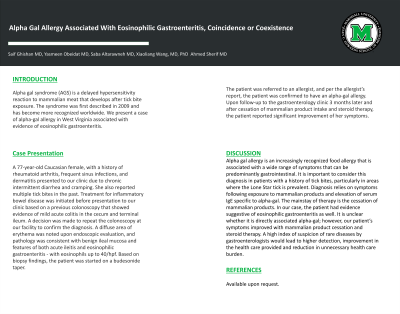Tuesday Poster Session
Category: Colon
P3163 - Alpha Gal Allergy Associated With Eosinophilic Gastroenteritis, Coincidence or Coexistence?
Tuesday, October 24, 2023
10:30 AM - 4:00 PM PT
Location: Exhibit Hall

Has Audio
- SG
Saif Ghishan, MD
Joan C. Edwards School of Medicine, Marshall University
Huntington, WV
Presenting Author(s)
Saif Ghishan, MD1, Yasmine Obeidat, MD1, Saba Altarawneh, MD2, Xiaoliang Wang, MD, PhD3, Ahmed Sherif, MD2
1Joan C. Edwards School of Medicine, Marshall University, Huntington, WV; 2Marshall University, Huntington, WV; 3Marshall University School of Medicine, Huntington, WV
Introduction: Alpha gal syndrome (AGS) is a delayed hypersensitivity reaction to mammalian meat that develops after tick bite exposure. The syndrome was first described in 2009 and has become more recognized worldwide. We present a case of alpha-gal allergy in West Virginia associated with evidence of eosinophilic gastroenteritis.
Case Description/Methods: A 77-year-old Caucasian female, with a history of rheumatoid arthritis, history of intermittent nasal congestion, runny nose, frequent sinus infections, and dermatitis presented to our clinic due to chronic intermittent diarrhea and cramping. She also reported multiple tick bites in the past. Treatment for inflammatory bowel disease was initiated before presentation to our clinic based on a previous colonoscopy that showed evidence of mild acute colitis in the cecum and terminal ileum. A decision was made to repeat the colonoscopy at our facility to confirm the diagnosis. A diffuse area of erythema was noted upon endoscopic evaluation, and pathology was consistent with benign ileal mucosa and features of both acute ileitis and eosinophilic gastroenteritis - with eosinophils up to 40/hpf. Based on biopsy findings, the patient was started on a budesonide taper. The patient was referred to an allergist, and per the allergist’s report, the patient was confirmed to have an alpha-gal allergy
Upon follow-up to the gastroenterology clinic 3 months later and after cessation of mammalian product intake and steroid therapy, the patient reported significant improvement of her symptoms.
Discussion: Alpha gal allergy is an increasingly recognized food allergy that is associated with a wide range of symptoms that can be predominantly gastrointestinal. It is important to consider this diagnosis in patients with a history of tick bites, particularly in areas where the Lone Star tick is prevalent. Diagnosis relies on symptoms following exposure to mammalian products and elevation of serum IgE specific to alpha-gal. The mainstay of therapy is the cessation of mammalian products. In our case, the patient had evidence suggestive of eosinophilic gastroenteritis as well. It is unclear whether it is directly associated alpha-gal; however, our patient’s symptoms improved with mammalian product cessation and steroid therapy. A high index of suspicion of rare diseases by gastroenterologists would lead to higher detection, improvement in the health care provided and reduction in unnecessary health care burden.
Disclosures:
Saif Ghishan, MD1, Yasmine Obeidat, MD1, Saba Altarawneh, MD2, Xiaoliang Wang, MD, PhD3, Ahmed Sherif, MD2. P3163 - Alpha Gal Allergy Associated With Eosinophilic Gastroenteritis, Coincidence or Coexistence?, ACG 2023 Annual Scientific Meeting Abstracts. Vancouver, BC, Canada: American College of Gastroenterology.
1Joan C. Edwards School of Medicine, Marshall University, Huntington, WV; 2Marshall University, Huntington, WV; 3Marshall University School of Medicine, Huntington, WV
Introduction: Alpha gal syndrome (AGS) is a delayed hypersensitivity reaction to mammalian meat that develops after tick bite exposure. The syndrome was first described in 2009 and has become more recognized worldwide. We present a case of alpha-gal allergy in West Virginia associated with evidence of eosinophilic gastroenteritis.
Case Description/Methods: A 77-year-old Caucasian female, with a history of rheumatoid arthritis, history of intermittent nasal congestion, runny nose, frequent sinus infections, and dermatitis presented to our clinic due to chronic intermittent diarrhea and cramping. She also reported multiple tick bites in the past. Treatment for inflammatory bowel disease was initiated before presentation to our clinic based on a previous colonoscopy that showed evidence of mild acute colitis in the cecum and terminal ileum. A decision was made to repeat the colonoscopy at our facility to confirm the diagnosis. A diffuse area of erythema was noted upon endoscopic evaluation, and pathology was consistent with benign ileal mucosa and features of both acute ileitis and eosinophilic gastroenteritis - with eosinophils up to 40/hpf. Based on biopsy findings, the patient was started on a budesonide taper. The patient was referred to an allergist, and per the allergist’s report, the patient was confirmed to have an alpha-gal allergy
Upon follow-up to the gastroenterology clinic 3 months later and after cessation of mammalian product intake and steroid therapy, the patient reported significant improvement of her symptoms.
Discussion: Alpha gal allergy is an increasingly recognized food allergy that is associated with a wide range of symptoms that can be predominantly gastrointestinal. It is important to consider this diagnosis in patients with a history of tick bites, particularly in areas where the Lone Star tick is prevalent. Diagnosis relies on symptoms following exposure to mammalian products and elevation of serum IgE specific to alpha-gal. The mainstay of therapy is the cessation of mammalian products. In our case, the patient had evidence suggestive of eosinophilic gastroenteritis as well. It is unclear whether it is directly associated alpha-gal; however, our patient’s symptoms improved with mammalian product cessation and steroid therapy. A high index of suspicion of rare diseases by gastroenterologists would lead to higher detection, improvement in the health care provided and reduction in unnecessary health care burden.
Disclosures:
Saif Ghishan indicated no relevant financial relationships.
Yasmine Obeidat indicated no relevant financial relationships.
Saba Altarawneh indicated no relevant financial relationships.
Xiaoliang Wang indicated no relevant financial relationships.
Ahmed Sherif indicated no relevant financial relationships.
Saif Ghishan, MD1, Yasmine Obeidat, MD1, Saba Altarawneh, MD2, Xiaoliang Wang, MD, PhD3, Ahmed Sherif, MD2. P3163 - Alpha Gal Allergy Associated With Eosinophilic Gastroenteritis, Coincidence or Coexistence?, ACG 2023 Annual Scientific Meeting Abstracts. Vancouver, BC, Canada: American College of Gastroenterology.
